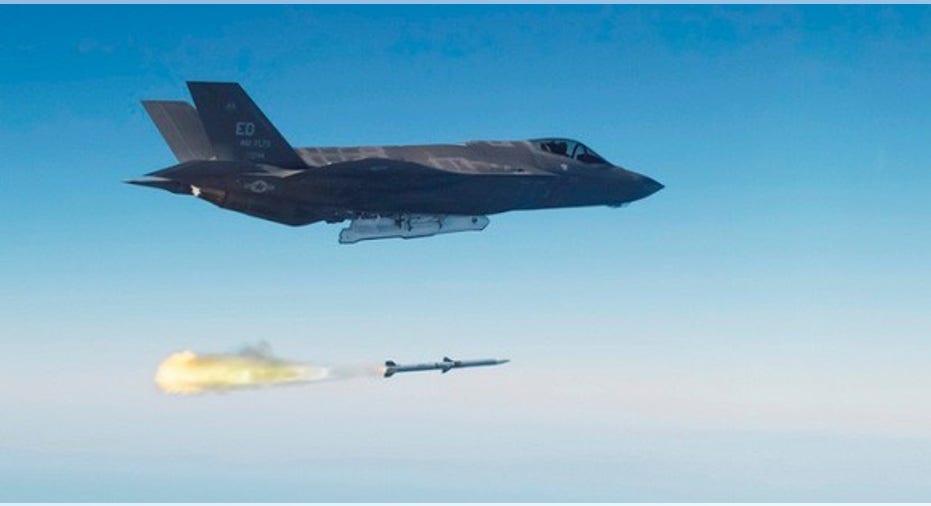Who Will Build Japan's New Drone Fighter Jet?

Japan has placed orders for Lockheed Martin's F-35 stealth fighter, but what it really wants is a stealth fighter of its own -- preferably unmanned. Image source: Lockheed Martin.
Nervous over aggressive actions by a resurgent China -- and a re-crazy North Korea -- the island nation has embarked upon a massive, multi-year defense spending binge and increased defense spending five years in succession. And that's just the beginning.
This year, Japan plans to spend $50.4 billion on its military. Next year, that number will go up to $51.6 billion -- the most the country has ever spent on defense. And over the next 20 years, the nation plans to spend billions more developing, first, a stealth fighter jet superior to Lockheed Martin's (NYSE: LMT) F-35, and later, a fleet of autonomous drone fighter jets as well.
Drones for Japan
As Reuters reported earlier this week, Japan's latest defense spending blueprint calls for the development of a drone air force in two stages. First, over the next decade, the country intends to develop a homegrown unmanned surveillance aircraft, similar to the RQ-4 Global Hawks that Japan bought from Northrop Grumman (NYSE: NOC) last year for $1.2 billion.
Subsequently, Japan plans to build on that development in the next 10-year period to produce an unmanned fighter jet.
Who is this "Japan" you speak of?
Now, while Japan -- and Japanese taxpayers -- will be footing the bill for the new drones' development, the actual work of building the new drones will probably fall to private industry.
It remains to be seen which particular companies the country's Defense Ministry will tap to do the actual work. In all likelihood, a homegrown drone project would be run primarily through local defense giant Mitsubishi Heavy Industries, which is developing the X-2 stealth fighter as well, as prime contractor.
As for the subcontractors, the best way to accelerate development of homegrown drones would be to attract companies with significant expertise in drones already, to assist -- Northrop Grumman and Boeing (NYSE: BA) for example. Earlier this year, Boeing won a small contract from the U.S. Air Force to begin conversion of 30 retired Lockheed Martin F-16s into unmanned "target drones" for the Air Force to use in target practice.
Northrop Grumman's experience is even more substantial. Three years ago, the company achieved the first successful autonomous landing of a robotic drone -- its X-47B Unmanned Combat Air System -- aboard an aircraft carrier. Northrop is also the one company DARPA tapped earlier this year to develop a mid-sized drone for use in non-carrier take-offs and landings from small warships.
There's also a third option, which may be the most intriguing of all.
Kratos Defense to the rescue?
While the larger contractors have been busy collecting large drone contracts in Washington, out in San Diego, a little-known specialist in drone target aircraft -- Kratos Defense & Security Solutions (NASDAQ: KTOS) -- has also been making some significant advances. Even more significantly, these have been in the field of jet-powered combat drones -- precisely what Japan is looking for.
Earlier this month, Kratos confirmed its third significant drone contract win in the past few months and dropped hints of an impending award that could see the Pentagon begin buying its weaponizable UTAP-22 Tornado combat drone. That sounds like the kind of technology that Japan would be interested in. In fact, with all of Kratos currently valued at less than $450 million, it's not out of the realm of possibility that a Japan that's interested in combat drones could also be interested in acquiring Kratos.
Whether as a partneror as a subsidiary of Mitsubishi, Kratos just might be exactly what Japan needs to jump-start its drone program.
A secret billion-dollar stock opportunity The world's biggest tech company forgot to show you something, but a few Wall Street analysts and the Fool didn't miss a beat: There's a small company that's powering their brand-new gadgets and the coming revolution in technology. And we think its stock price has nearly unlimited room to run for early in-the-know investors! To be one of them, just click here.
Fool contributorRich Smithdoes not own shares of, nor is he short, any company named above. You can find him onMotley Fool CAPS, publicly pontificating under the handleTMFDitty, where he's currently ranked No. 301 out of more than 75,000 rated members.
The Motley Fool has no position in any of the stocks mentioned. Try any of our Foolish newsletter services free for 30 days. We Fools may not all hold the same opinions, but we all believe that considering a diverse range of insights makes us better investors. The Motley Fool has a disclosure policy.



















